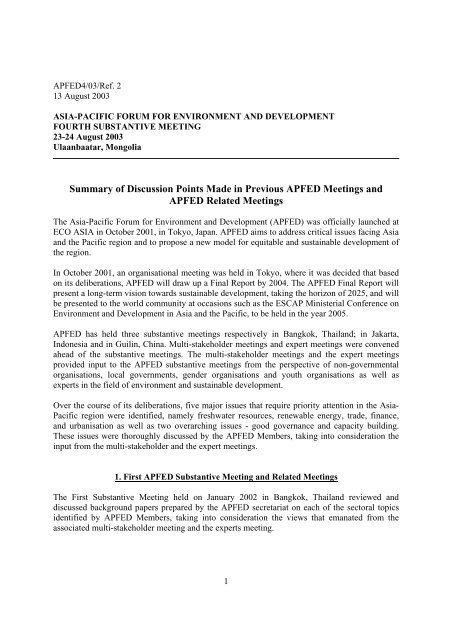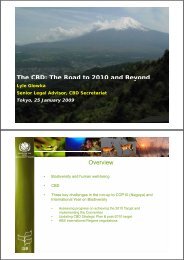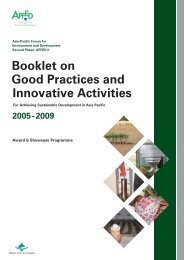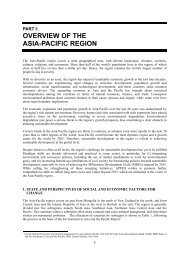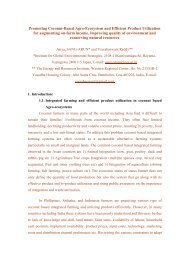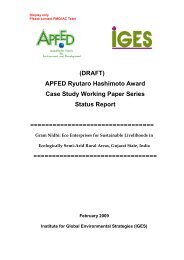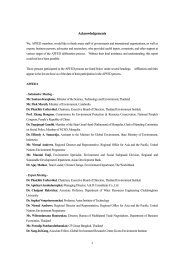Summary of Discussion Points Made in Previous APFED Meetings ...
Summary of Discussion Points Made in Previous APFED Meetings ...
Summary of Discussion Points Made in Previous APFED Meetings ...
You also want an ePaper? Increase the reach of your titles
YUMPU automatically turns print PDFs into web optimized ePapers that Google loves.
<strong>APFED</strong>4/03/Ref. 2<br />
13 August 2003<br />
ASIA-PACIFIC FORUM FOR ENVIRONMENT AND DEVELOPMENT<br />
FOURTH SUBSTANTIVE MEETING<br />
23-24 August 2003<br />
Ulaanbaatar, Mongolia<br />
<strong>Summary</strong> <strong>of</strong> <strong>Discussion</strong> <strong>Po<strong>in</strong>ts</strong> <strong>Made</strong> <strong>in</strong> <strong>Previous</strong> <strong>APFED</strong> Meet<strong>in</strong>gs and<br />
<strong>APFED</strong> Related Meet<strong>in</strong>gs<br />
The Asia-Pacific Forum for Environment and Development (<strong>APFED</strong>) was <strong>of</strong>ficially launched at<br />
ECO ASIA <strong>in</strong> October 2001, <strong>in</strong> Tokyo, Japan. <strong>APFED</strong> aims to address critical issues fac<strong>in</strong>g Asia<br />
and the Pacific region and to propose a new model for equitable and susta<strong>in</strong>able development <strong>of</strong><br />
the region.<br />
In October 2001, an organisational meet<strong>in</strong>g was held <strong>in</strong> Tokyo, where it was decided that based<br />
on its deliberations, <strong>APFED</strong> will draw up a F<strong>in</strong>al Report by 2004. The <strong>APFED</strong> F<strong>in</strong>al Report will<br />
present a long-term vision towards susta<strong>in</strong>able development, tak<strong>in</strong>g the horizon <strong>of</strong> 2025, and will<br />
be presented to the world community at occasions such as the ESCAP M<strong>in</strong>isterial Conference on<br />
Environment and Development <strong>in</strong> Asia and the Pacific, to be held <strong>in</strong> the year 2005.<br />
<strong>APFED</strong> has held three substantive meet<strong>in</strong>gs respectively <strong>in</strong> Bangkok, Thailand; <strong>in</strong> Jakarta,<br />
Indonesia and <strong>in</strong> Guil<strong>in</strong>, Ch<strong>in</strong>a. Multi-stakeholder meet<strong>in</strong>gs and expert meet<strong>in</strong>gs were convened<br />
ahead <strong>of</strong> the substantive meet<strong>in</strong>gs. The multi-stakeholder meet<strong>in</strong>gs and the expert meet<strong>in</strong>gs<br />
provided <strong>in</strong>put to the <strong>APFED</strong> substantive meet<strong>in</strong>gs from the perspective <strong>of</strong> non-governmental<br />
organisations, local governments, gender organisations and youth organisations as well as<br />
experts <strong>in</strong> the field <strong>of</strong> environment and susta<strong>in</strong>able development.<br />
Over the course <strong>of</strong> its deliberations, five major issues that require priority attention <strong>in</strong> the Asia-<br />
Pacific region were identified, namely freshwater resources, renewable energy, trade, f<strong>in</strong>ance,<br />
and urbanisation as well as two overarch<strong>in</strong>g issues - good governance and capacity build<strong>in</strong>g.<br />
These issues were thoroughly discussed by the <strong>APFED</strong> Members, tak<strong>in</strong>g <strong>in</strong>to consideration the<br />
<strong>in</strong>put from the multi-stakeholder and the expert meet<strong>in</strong>gs.<br />
1. First <strong>APFED</strong> Substantive Meet<strong>in</strong>g and Related Meet<strong>in</strong>gs<br />
The First Substantive Meet<strong>in</strong>g held on January 2002 <strong>in</strong> Bangkok, Thailand reviewed and<br />
discussed background papers prepared by the <strong>APFED</strong> secretariat on each <strong>of</strong> the sectoral topics<br />
identified by <strong>APFED</strong> Members, tak<strong>in</strong>g <strong>in</strong>to consideration the views that emanated from the<br />
associated multi-stakeholder meet<strong>in</strong>g and the experts meet<strong>in</strong>g.<br />
1
Keys po<strong>in</strong>ts brought to the attention <strong>of</strong> <strong>APFED</strong> Members by the multi-stakeholder meet<strong>in</strong>g<br />
<strong>in</strong>cluded:<br />
‣ The devolution <strong>of</strong> power and empowerment <strong>of</strong> multi-stakeholder, via:<br />
o Education and awareness-build<strong>in</strong>g;<br />
o Appropriate valuation <strong>of</strong> decentralised actions and local knowledge; and<br />
o Appropriate representation <strong>of</strong> multi-stakeholder dur<strong>in</strong>g decision-mak<strong>in</strong>g<br />
processes;<br />
‣ The creation and optimisation <strong>of</strong> partnerships both with<strong>in</strong> and across borders, and<br />
‣ The reconceptualisation <strong>of</strong> certa<strong>in</strong> fundamental issues, <strong>in</strong>clud<strong>in</strong>g:<br />
o Redef<strong>in</strong><strong>in</strong>g “progress,” “good livelihood,” and parameters for their measurement;<br />
o Redef<strong>in</strong><strong>in</strong>g “costs” and establish<strong>in</strong>g alternatives to consumerism;<br />
o Redef<strong>in</strong><strong>in</strong>g the true stakeholders <strong>in</strong> production and consumption processes while<br />
redef<strong>in</strong><strong>in</strong>g the real costs <strong>of</strong> production and consumption; and<br />
o Reth<strong>in</strong>k<strong>in</strong>g susta<strong>in</strong>able development concepts <strong>in</strong> terms <strong>of</strong> the Earth Charter<br />
pr<strong>in</strong>ciples.<br />
The multi-stakeholder meet<strong>in</strong>g urged <strong>APFED</strong> to endorse the Earth Charter for adoption as a<br />
global ethical framework for susta<strong>in</strong>able development.<br />
The expert meet<strong>in</strong>g addressed the issues <strong>of</strong> freshwater, renewable energy and trade. Three<br />
recommendations emerged for <strong>APFED</strong> to pursue <strong>in</strong> the area <strong>of</strong> freshwater:<br />
‣ Demand management and full cost pric<strong>in</strong>g for water to create the impetus for a reduction<br />
<strong>in</strong> usage, which is clearly necessary even though pric<strong>in</strong>g is a politically difficult topic to<br />
broach;<br />
‣ Conflict resolution over water issues, such as ensur<strong>in</strong>g rights <strong>of</strong> both upper-river and<br />
lower-river users; and<br />
‣ Poverty, especially <strong>in</strong> relation to urbanisation.<br />
With regard to trade and susta<strong>in</strong>able development, experts raised the follow<strong>in</strong>g po<strong>in</strong>ts:<br />
‣ The urgency for both rich and poor countries to pay attention to trade and the<br />
environment and to be vigilant about motivations for environmental conditions on trade,<br />
as they could be genu<strong>in</strong>e means <strong>of</strong> enhanc<strong>in</strong>g environmental conservation but could<br />
equally be used as non-tariff barriers;<br />
‣ The need to safeguard weaker countries <strong>in</strong> the trade arena or weaker corporate entities,<br />
such as SMEs.<br />
With regard to renewable energy, experts concluded that:<br />
‣ Renewable energy should be very much encouraged, and not only <strong>in</strong> rural areas;<br />
‣ There must be mobilisation <strong>of</strong> f<strong>in</strong>ancial resources <strong>in</strong>clud<strong>in</strong>g micr<strong>of</strong><strong>in</strong>anc<strong>in</strong>g for renewable<br />
energy;<br />
‣ There is a need for a paradigm shift to get away from the supply-side management<br />
approach that has been used up to now.<br />
2
The <strong>APFED</strong> Substantive Meet<strong>in</strong>g discussed the sectoral topics <strong>of</strong> freshwater resources,<br />
renewable energy, trade and f<strong>in</strong>ance and made the follow<strong>in</strong>g po<strong>in</strong>ts:<br />
On freshwater resources:<br />
‣ Water issues hav<strong>in</strong>g special relevance to the Asia-Pacific region <strong>in</strong>clude: the uneven<br />
distribution <strong>of</strong> water over space and time (e.g., monsoons, typhoons); the considerable<br />
differences among the most press<strong>in</strong>g water issues affect<strong>in</strong>g subregions; extreme water<br />
distribution variations (e.g., droughts, floods) and the need for adaptive measures; the<br />
shar<strong>in</strong>g <strong>of</strong> <strong>in</strong>ternational water courses; the relationship between population growth and<br />
urbanisation and both water supply and sanitation issues, immigration from water-scarce<br />
areas to water affluent areas; and the alleviation <strong>of</strong> poverty as a key means for solv<strong>in</strong>g<br />
water-related problems.<br />
‣ Integrated water resource management and the <strong>in</strong>corporation <strong>of</strong> a wide range <strong>of</strong> sectors,<br />
stakeholders, and governmental and political entities were deemed crucial, with user<br />
consultation and implementation <strong>of</strong> action plans and <strong>in</strong>vestment strategies <strong>of</strong> the private<br />
sector cited as potential strategies.<br />
‣ Water pric<strong>in</strong>g was emphasised as an essential step towards resolv<strong>in</strong>g many key water<br />
issues, with three caveats:<br />
o Increased awareness <strong>of</strong> water as an economic good is essential for public<br />
acceptance <strong>of</strong> pric<strong>in</strong>g;<br />
o Intimate causal relationship between delivery method and price requires<br />
improvement <strong>of</strong> water delivery/distribution systems; and<br />
o Implementation <strong>of</strong> water pric<strong>in</strong>g must not harm the <strong>in</strong>terests <strong>of</strong> the poor.<br />
On renewable energy:<br />
‣ Several members urged the Forum to make the dist<strong>in</strong>ction between what can realistically<br />
be achieved <strong>in</strong> the short term and what cannot be achieved for some time.<br />
‣ It was recognised that each country needs to pursue its own <strong>in</strong>dividually-tailored energy<br />
mix, as each country will experience a different cost for each k<strong>in</strong>d <strong>of</strong> energy available.<br />
‣ Along with the promotion <strong>of</strong> renewable energy, demand-side management <strong>of</strong><br />
conventional sources <strong>of</strong> energy through <strong>in</strong>creased efficiency <strong>of</strong> use, as a not only<br />
necessary but also immediately-implementable approach.<br />
‣ The primary obstacles to the promotion <strong>of</strong> renewable energy recognised were:<br />
o (1) Lack <strong>of</strong> appropriate products and;<br />
o (2) Lack <strong>of</strong> feasible means <strong>of</strong> <strong>in</strong>troduc<strong>in</strong>g products, <strong>of</strong> which the ma<strong>in</strong> issues were<br />
seen to be (a) difficulties <strong>in</strong> f<strong>in</strong>anc<strong>in</strong>g the <strong>in</strong>itial <strong>in</strong>vestment and (b) lack <strong>of</strong><br />
ma<strong>in</strong>tenance systems, as expla<strong>in</strong>ed below.<br />
On trade and susta<strong>in</strong>able development<br />
‣ Trade was emphasised as better than aid, but only <strong>in</strong>s<strong>of</strong>ar as it benefits both the<br />
environment and the poor.<br />
‣ While various standards now exist <strong>in</strong> the trade arena <strong>in</strong> many areas, such as labor, they do<br />
not yet exist for the environment. In this regard, environmental impact assessments and<br />
country studies are crucial <strong>in</strong> reveal<strong>in</strong>g the hidden environmental, social, and economic<br />
consequences <strong>of</strong> policy decisions.<br />
‣ With regard to environmentally-sound technologies:<br />
3
o<br />
o<br />
o<br />
o<br />
(1) Means <strong>of</strong> reward<strong>in</strong>g developers <strong>of</strong> new technologies amply without giv<strong>in</strong>g<br />
them exclusive <strong>in</strong>tellectual property rights should be considered, perhaps by<br />
develop<strong>in</strong>g such technologies through public-private cooperative set-ups.<br />
(2) The possible <strong>in</strong>terl<strong>in</strong>kage <strong>of</strong> WTO agreements with multilateral environmental<br />
agreements would represent an enormous step forward if accomplished. However,<br />
if this l<strong>in</strong>kage is not established, then del<strong>in</strong>kage from WTO rules regard<strong>in</strong>g IP<br />
rights may be possible.<br />
(3) South-south technical transfers and the development <strong>of</strong> <strong>in</strong>digenous<br />
technologies may provide the most appropriate technologies for the region.<br />
(4) Internalisation <strong>of</strong> externalities such as pollution and their reflection <strong>in</strong> costs to<br />
consumers would assist immensely <strong>in</strong> the preservation <strong>of</strong> the environment.<br />
On f<strong>in</strong>ance for susta<strong>in</strong>able development<br />
‣ The Forum recognised that while <strong>in</strong>creased fund<strong>in</strong>g and new fund<strong>in</strong>g mechanisms are<br />
certa<strong>in</strong>ly desirable, it was essential to devise means <strong>of</strong> more effectively us<strong>in</strong>g the<br />
resources actually available.<br />
‣ Debt for nature, debt for poverty alleviation, debt for education, debt for social<br />
programmes, and debt for clean water should all be considered as means for reduc<strong>in</strong>g<br />
countries' foreign debt.<br />
‣ Develop<strong>in</strong>g countries need to fully mobilise domestic resources, reallocat<strong>in</strong>g national<br />
fund<strong>in</strong>g priorities to susta<strong>in</strong>able development and poverty alleviation projects.<br />
‣ Expand<strong>in</strong>g donor nations' responsibilities beyond the mere allocation <strong>of</strong> funds to the<br />
coord<strong>in</strong>ation <strong>of</strong> ODA and l<strong>in</strong>kage <strong>of</strong> FDI and ODA was urged.<br />
‣ Private sector <strong>in</strong>vestment must be more actively aligned with susta<strong>in</strong>able development<br />
goals, with <strong>in</strong>centives for such alignment to be identified <strong>in</strong> concrete terms and set <strong>in</strong><br />
place.<br />
‣ Ideas regard<strong>in</strong>g other fund<strong>in</strong>g mechanisms <strong>in</strong>cluded evolv<strong>in</strong>g foreign aid <strong>in</strong>to a foreign<br />
aid fund; establishment <strong>of</strong> a regional trust fund; establishment <strong>of</strong> a special fund with<strong>in</strong> the<br />
ADB, such as the current ADB special fund for poverty reduction; and establishment <strong>of</strong> a<br />
regional environment fund with fund<strong>in</strong>g criteria similar to those <strong>of</strong> the Global<br />
Environment Facility; explor<strong>in</strong>g the viability <strong>of</strong> global taxes and carbon dioxide taxes.<br />
2. Second <strong>APFED</strong> Substantive Meet<strong>in</strong>g and Related Meet<strong>in</strong>gs<br />
Follow<strong>in</strong>g discussions on sectoral topics at the First Substantive Meet<strong>in</strong>g, the Second <strong>APFED</strong><br />
Substantive Meet<strong>in</strong>g held on May 2002, <strong>in</strong> Jakarta, Indonesia reviewed the Draft <strong>APFED</strong><br />
Message to the World Summit on Susta<strong>in</strong>able Development (WSSD), which had been compiled<br />
by the <strong>APFED</strong> Secretariat on the basis <strong>of</strong> <strong>APFED</strong> deliberations. The Draft Message received<br />
<strong>in</strong>put from expert meet<strong>in</strong>gs held <strong>in</strong> Tokyo, Japan and New Delhi, India, and a multi-stakeholder<br />
meet<strong>in</strong>g held <strong>in</strong> Jakarta.<br />
The expert meet<strong>in</strong>g on freshwater resources made the follow<strong>in</strong>g comments on the Message:<br />
‣ Importance <strong>of</strong> flood control; promotion <strong>of</strong> effective use <strong>of</strong> water; impact <strong>of</strong> import and<br />
export <strong>of</strong> virtual water through <strong>in</strong>ternational trade <strong>of</strong> forest products; importance <strong>of</strong><br />
monitor<strong>in</strong>g and assessment.<br />
‣ Water and security, <strong>in</strong>clud<strong>in</strong>g the prevention <strong>of</strong> conflicts and recovery from conflicts, was<br />
mentioned as a new aspect <strong>of</strong> water issues.<br />
4
‣ There was a suggestion regard<strong>in</strong>g the establishment <strong>of</strong> a new <strong>in</strong>ternational organisation<br />
on freshwater resources. However, many experts <strong>in</strong>dicated that strengthen<strong>in</strong>g exist<strong>in</strong>g<br />
bodies and enhanc<strong>in</strong>g their network<strong>in</strong>g should be considered as a first step, <strong>in</strong>stead <strong>of</strong><br />
establish<strong>in</strong>g new <strong>in</strong>stitutions.<br />
On the issue <strong>of</strong> f<strong>in</strong>anc<strong>in</strong>g, experts recommended the follow<strong>in</strong>g to be <strong>in</strong>cluded <strong>in</strong> the Message:<br />
‣ Domestic funds should be the largest source <strong>of</strong> f<strong>in</strong>anc<strong>in</strong>g for susta<strong>in</strong>able development.<br />
‣ ODA should be used more effectively and promoted especially <strong>in</strong> the areas <strong>of</strong> water and<br />
renewable energy and that ODA and FDI should be considered as complementary.<br />
‣ New fund<strong>in</strong>g mechanisms such as the Clean Development Mechanism should be strongly<br />
promoted.<br />
‣ External trade is a major <strong>in</strong>strument for develop<strong>in</strong>g countries to mobilise additional<br />
resources from their own efforts.<br />
With respect to trade and susta<strong>in</strong>able development, experts suggested that:<br />
‣ The recommendation on promot<strong>in</strong>g environmentally-sound technologies (ESTs) was not<br />
only relevant to trade, but also to other issues. It was suggested that ESTs could be<br />
considered <strong>in</strong> <strong>APFED</strong> future deliberations for preparation <strong>of</strong> the <strong>APFED</strong> F<strong>in</strong>al Report.<br />
‣ Experts po<strong>in</strong>ted out that common knowledge <strong>in</strong> the countries <strong>of</strong> Asia and the Pacific<br />
should be given ownership and be protected as a common property.<br />
‣ The fact that an <strong>in</strong>crease <strong>in</strong> cost due to higher environmental standards makes it difficult<br />
for develop<strong>in</strong>g countries to expand exports was also raised as a matter <strong>of</strong> concern.<br />
On the issue <strong>of</strong> renewable energy, experts emphasised:<br />
‣ The importance <strong>of</strong> the <strong>in</strong>volvement <strong>of</strong> members <strong>of</strong> the community from early stages <strong>of</strong><br />
renewable energy development, so that they are able to build their own capacity <strong>in</strong> the<br />
use and ma<strong>in</strong>tenance <strong>of</strong> the facilities.<br />
‣ A proposal to <strong>in</strong>itiate and negotiate an <strong>in</strong>ternational convention on renewable energy was<br />
discussed from the viewpo<strong>in</strong>t <strong>of</strong> energy experts. In the view <strong>of</strong> the expert meet<strong>in</strong>g, while<br />
further efforts need to be made for promot<strong>in</strong>g renewable energy, a new convention for<br />
renewable energy would not be an appropriate <strong>in</strong>strument, s<strong>in</strong>ce each country has its own<br />
best energy mix to be decided by the national government.<br />
‣ Collect<strong>in</strong>g best practices was suggested for future deliberation, to serve as models for<br />
reference and for replication.<br />
The multi-stakeholder meet<strong>in</strong>g made the follow<strong>in</strong>g comments on the Draft <strong>APFED</strong> Message:<br />
On freshwater resources:<br />
‣ Despite the trend towards privatisation and liberalisation, proper regulation is vital.<br />
‣ Countries <strong>in</strong> the region should adopt common effluent standards.<br />
‣ Consumption patterns affect<strong>in</strong>g water need to be changed and <strong>in</strong>centives for conservation<br />
should be developed.<br />
‣ The <strong>APFED</strong> draft should clearly <strong>in</strong>dicate that water is public property, and access to<br />
water is a human right.<br />
‣ The l<strong>in</strong>ks between freshwater and ecosystems, land tenure rights, and rights to utilise<br />
natural resources are crucial.<br />
5
On renewable energy:<br />
‣ The poor need <strong>in</strong>creased access to electricity.<br />
‣ Indigenous technologies should be given greater importance.<br />
‣ Redirect<strong>in</strong>g <strong>of</strong> fossil fuel subsidies to renewable energies would be <strong>in</strong>sufficient to fully<br />
support the development <strong>of</strong> renewable energy technologies (RETs).<br />
‣ Conservation, not merely better utilization <strong>of</strong> energy, is critical for susta<strong>in</strong>able<br />
development.<br />
‣ Renewable energy should be promoted with<strong>in</strong> the national energy mix.<br />
On trade and susta<strong>in</strong>able development:<br />
‣ Trade should be highlighted as a means for, and not the goal <strong>of</strong>, achiev<strong>in</strong>g susta<strong>in</strong>able<br />
development.<br />
‣ It would be naïve to assume that free trade alone can alleviate poverty; there is a need for<br />
a level play<strong>in</strong>g field, <strong>in</strong> particular with regard to weaker traders as globalisation tends to<br />
<strong>in</strong>crease the gap between the weak and the strong.<br />
‣ The promotion <strong>of</strong> environmentally-sound technologies is relevant to enterprises <strong>of</strong> all<br />
sizes.<br />
‣ Partnerships envisioned by <strong>APFED</strong> need to be clearly def<strong>in</strong>ed with<strong>in</strong> the draft, <strong>in</strong>dicat<strong>in</strong>g<br />
explicitly that develop<strong>in</strong>g countries should not be a mere market for EST products made<br />
<strong>in</strong> developed countries.<br />
‣ Trade issues as they relate to the Convention on Biological Diversity, <strong>in</strong> particular, with<br />
regard to genetically modified organisms should be mentioned.<br />
On f<strong>in</strong>ance for susta<strong>in</strong>able development:<br />
‣ The targets, purposes, and programmes for the Clean Development Mechanism (CDM)<br />
should be reflected clearly <strong>in</strong> the draft such that CO2 reductions are assured and that<br />
<strong>in</strong>centives are not given for bus<strong>in</strong>ess as usual.<br />
‣ With regard to encourag<strong>in</strong>g the use <strong>of</strong> private capital <strong>in</strong> susta<strong>in</strong>able development, the<br />
current situation <strong>of</strong> capital markets threatens, not promotes, susta<strong>in</strong>able development.<br />
On overarch<strong>in</strong>g issues:<br />
‣ ‘Good governance’ is a key issue which has implications for both governments and<br />
corporations.<br />
‣ Capacity build<strong>in</strong>g efforts should <strong>in</strong>clude awareness build<strong>in</strong>g regard<strong>in</strong>g environmental<br />
issues <strong>in</strong> general and susta<strong>in</strong>able development <strong>in</strong> particular and that youth require<br />
education and tra<strong>in</strong><strong>in</strong>g, especially but not only for use <strong>of</strong> RETs. Capacity build<strong>in</strong>g<br />
regard<strong>in</strong>g decision-mak<strong>in</strong>g processes is critical.<br />
‣ Gender issues should be considered as another overarch<strong>in</strong>g theme for the <strong>APFED</strong><br />
Message.<br />
In the light <strong>of</strong> previous discussions among its members on the <strong>in</strong>put from the expert meet<strong>in</strong>g and<br />
the multi-stakeholder meet<strong>in</strong>g, the <strong>APFED</strong> substantive meet<strong>in</strong>g reviewed and f<strong>in</strong>alised the<br />
<strong>APFED</strong> Message to the WSSD. The Message presented recommendations related to the 5<br />
sectoral issues and two cross-sectoral issues that have been discussed. The recommendations<br />
po<strong>in</strong>t to challenges fac<strong>in</strong>g the Asia-Pacific region with respect to these issues and modalities <strong>of</strong><br />
action that would drive progress. The key elements <strong>of</strong> the recommendations were as follows:<br />
6
On freshwater resources:<br />
‣ Formulate comprehensive water policies and effective implementation mechanisms at the<br />
national and local levels.<br />
‣ Promote comprehensive monitor<strong>in</strong>g and assessment <strong>in</strong> river bas<strong>in</strong>s and groundwater<br />
catchment areas.<br />
‣ Formulate cooperative mechanisms <strong>in</strong> shared freshwater resources to avoid conflicts.<br />
On renewable energy:<br />
‣ Encourage use <strong>of</strong> renewable energy systems and services <strong>in</strong> communities.<br />
‣ Optimise the use <strong>of</strong> pert<strong>in</strong>ent renewable energy products and services <strong>in</strong> ways appropriate<br />
to the conditions <strong>of</strong> each locale.<br />
On trade and susta<strong>in</strong>able development:<br />
‣ Build capacity <strong>in</strong> trade-environment policy analysis and implementation.<br />
‣ Promote environmentally sound technologies (ESTs) by reward<strong>in</strong>g small and medium<br />
sized enterprises (SMEs) who use them.<br />
‣ Ensure that trade acts as a tool for susta<strong>in</strong>able development.<br />
On f<strong>in</strong>ance for susta<strong>in</strong>able development:<br />
‣ Make the best use <strong>of</strong> <strong>of</strong>ficial development assistance (ODA) and domestic resources.<br />
‣ Increase the contribution <strong>of</strong> private capital to susta<strong>in</strong>able development.<br />
‣ Enable the full effects <strong>of</strong> exist<strong>in</strong>g and additional <strong>in</strong>ternational fund<strong>in</strong>g mechanisms.<br />
On urbanisation:<br />
‣ Encourage countries <strong>in</strong> the region to take an <strong>in</strong>tegrated approach to manage urbanisation.<br />
‣ Strengthen local <strong>in</strong>itiatives <strong>in</strong> the management <strong>of</strong> urban environments.<br />
On good governance:<br />
‣ Facilitate devolution <strong>of</strong> power from central governments and empowerment <strong>of</strong><br />
stakeholders.<br />
‣ Facilitate devolution <strong>of</strong> power and empowerment <strong>of</strong> stakeholders.<br />
On Capacity Build<strong>in</strong>g:<br />
‣ Take a well-f<strong>in</strong>anced and structured approach to capacity build<strong>in</strong>g.<br />
In the Message, <strong>APFED</strong> committed to launch three new partnership <strong>in</strong>itiatives: collection and<br />
analysis <strong>of</strong> best policy practices related to the actions recommended <strong>in</strong> the Message,<br />
development <strong>of</strong> a network <strong>of</strong> researchers and research <strong>in</strong>stitutions, and creation <strong>of</strong> an <strong>in</strong>ventory<br />
<strong>of</strong> capacity build<strong>in</strong>g programmes <strong>in</strong> Asia and the Pacific region and their dissem<strong>in</strong>ation.<br />
3. Third <strong>APFED</strong> Substantive Meet<strong>in</strong>g and Related Meet<strong>in</strong>gs<br />
The Third <strong>APFED</strong> Substantive Meet<strong>in</strong>g held on January 2003 <strong>in</strong> Guil<strong>in</strong>, People’s Republic <strong>of</strong><br />
Ch<strong>in</strong>a, discussed and adopted the Chair's Prelim<strong>in</strong>ary Proposal on the Structure <strong>of</strong> the <strong>APFED</strong><br />
F<strong>in</strong>al Report and <strong>APFED</strong> Commitments, the substance <strong>of</strong> which would draw upon issues<br />
7
identified <strong>in</strong> previous meet<strong>in</strong>gs. The meet<strong>in</strong>g was preceded by an expert meet<strong>in</strong>g which<br />
discussed an <strong>in</strong>tegrated approach to manag<strong>in</strong>g urbanisation with particular emphasis on<br />
susta<strong>in</strong>able land use. The multi-stakeholder meet<strong>in</strong>g focused on the <strong>APFED</strong> F<strong>in</strong>al Report and<br />
made the follow<strong>in</strong>g po<strong>in</strong>ts:<br />
(a) Topics to be <strong>in</strong>cluded:<br />
‣ There was general agreement about the relevance <strong>of</strong> the seven topics already conta<strong>in</strong>ed <strong>in</strong><br />
the <strong>APFED</strong> Message – freshwater resources, renewable energy, trade, f<strong>in</strong>ance,<br />
urbanisation, good governance and capacity build<strong>in</strong>g, as possible subjects to be <strong>in</strong>cluded<br />
<strong>in</strong> the F<strong>in</strong>al Report. In addition to these 7 topics, the issues <strong>of</strong> desertification and<br />
efficiency <strong>in</strong> the use and management <strong>of</strong> resources were among issues suggested by<br />
participants.<br />
‣ Trade and f<strong>in</strong>ance should be regarded as overarch<strong>in</strong>g issues rather than sectoral issues.<br />
These, added to the two overarch<strong>in</strong>g issues already established, namely governance and<br />
capacity build<strong>in</strong>g, would make four overarch<strong>in</strong>g issues to serve as the basis for analysis<br />
<strong>of</strong> the sectoral issues. The issue <strong>of</strong> susta<strong>in</strong>able patterns <strong>of</strong> production and consumption<br />
was proposed as another possible overarch<strong>in</strong>g issue.<br />
‣ The report should <strong>in</strong>corporate at the very beg<strong>in</strong>n<strong>in</strong>g a presentation <strong>of</strong> the state <strong>of</strong> the<br />
environment <strong>in</strong> the Asia-Pacific, convey<strong>in</strong>g a sense <strong>of</strong> crisis and urgency for action <strong>in</strong> the<br />
region. Moreover, the open<strong>in</strong>g to the report could conta<strong>in</strong> some ethical underp<strong>in</strong>n<strong>in</strong>gs<br />
regard<strong>in</strong>g susta<strong>in</strong>able development, touch<strong>in</strong>g upon issues <strong>of</strong> peace, social justice and<br />
human rights which are dimensions <strong>of</strong> susta<strong>in</strong>able development.<br />
(b) Structure:<br />
‣ The f<strong>in</strong>al output should have one concise and focused report which would <strong>in</strong>clude<br />
specific recommendations and an annex that provides detailed scientific analysis and the<br />
factual basis <strong>of</strong> the report.<br />
‣ It was proposed that cases <strong>of</strong> successful practices also be <strong>in</strong>cluded <strong>in</strong> the annex.<br />
Therefore, the result <strong>of</strong> the collection <strong>of</strong> BPP would be partly used as <strong>in</strong>put.<br />
(c) Draft<strong>in</strong>g process:<br />
‣ There was a proposal to set up a draft<strong>in</strong>g committee composed <strong>of</strong> experts on the issues<br />
covered <strong>in</strong> the report as well as other stakeholders that have been <strong>in</strong>volved <strong>in</strong> the <strong>APFED</strong><br />
process.<br />
‣ Lead authors would be designated for each specific issue along with a network <strong>of</strong> writers.<br />
In this process, resources from the NetRes could be used as a valuable pool <strong>of</strong> expertise.<br />
(d) Dissem<strong>in</strong>ation:<br />
‣ Tak<strong>in</strong>g <strong>in</strong>to consideration the fact that one <strong>of</strong> the advantages <strong>of</strong> <strong>APFED</strong> lies <strong>in</strong> the quality<br />
<strong>of</strong> its members and their <strong>in</strong>fluence at various levels <strong>of</strong> decision-mak<strong>in</strong>g, <strong>APFED</strong><br />
Members themselves would be a valuable channel for dissem<strong>in</strong>at<strong>in</strong>g the report <strong>in</strong> the<br />
relevant fora deal<strong>in</strong>g with susta<strong>in</strong>able development <strong>in</strong> the region.<br />
8
‣ For the purpose <strong>of</strong> reach<strong>in</strong>g the widest range <strong>of</strong> people, it was suggested that the report be<br />
translated <strong>in</strong>to many different languages <strong>of</strong> the region, <strong>in</strong>clud<strong>in</strong>g those <strong>of</strong> the <strong>APFED</strong><br />
Members.<br />
Tak<strong>in</strong>g <strong>in</strong>to consideration the <strong>in</strong>put from the experts and the stakeholders, and <strong>in</strong> l<strong>in</strong>e with the<br />
discussions among the <strong>APFED</strong> Members, the Chairperson made a prelim<strong>in</strong>ary proposal on the<br />
<strong>APFED</strong> F<strong>in</strong>al Report and Commitments. The proposal <strong>in</strong>dicated that:<br />
‣ <strong>APFED</strong> F<strong>in</strong>al Report will have two components. A summary document will present <strong>in</strong> a<br />
concise yet straightforward manner a vision, which will be the key message <strong>of</strong> the report<br />
- “Susta<strong>in</strong>able Asia-Pacific <strong>in</strong> 2025” - <strong>in</strong> about ten to twenty pages. A second, more<br />
elaborated document will consist <strong>of</strong> the report. The report -“Roadmap towards<br />
Susta<strong>in</strong>able Asia-Pacific” - will be <strong>of</strong> around 100 pages that draw a course <strong>of</strong> action and<br />
policies required for achiev<strong>in</strong>g the vision expressed <strong>in</strong> the concise document. It will<br />
constitute the factual basis for the report, tak<strong>in</strong>g <strong>in</strong>to consideration the <strong>in</strong>put from the<br />
collection <strong>of</strong> Best Policy Practices, research activities generated through the development<br />
<strong>of</strong> a network <strong>of</strong> research <strong>in</strong>stitutions <strong>in</strong> the Asia-Pacific region and the draft<strong>in</strong>g <strong>of</strong><br />
background papers.<br />
‣ In substance, the Report will elaborate on four key components <strong>of</strong> susta<strong>in</strong>ability:<br />
strengthen<strong>in</strong>g the economic basis for susta<strong>in</strong>able development (i.e. environmentally<br />
sound bus<strong>in</strong>ess activities, trade); enhanc<strong>in</strong>g the social basis for susta<strong>in</strong>able development<br />
(i.e. poverty alleviation, land use and urbanisation, susta<strong>in</strong>able consumption); secur<strong>in</strong>g<br />
the material basis for susta<strong>in</strong>able development (i.e. energy, freshwater, land); enhanc<strong>in</strong>g<br />
the <strong>in</strong>stitutional basis for susta<strong>in</strong>able development (i.e. ethics and human capacity,<br />
governance, positive feedback among social actors).<br />
‣ Lead author groups composed <strong>of</strong> 3 to 5 <strong>APFED</strong> Members will, with support from the<br />
<strong>APFED</strong> secretariat and experts <strong>in</strong> the topics covered, draft sectoral chapters <strong>of</strong> the report.<br />
Follow<strong>in</strong>g the guidance provided by the Third Substantive Meet<strong>in</strong>g, the <strong>APFED</strong> secretariat has<br />
started the preparation <strong>of</strong> the Zero Draft <strong>of</strong> the <strong>APFED</strong> F<strong>in</strong>al Report. It is expected that the Zero<br />
Draft will serve as a basis for discussions by <strong>APFED</strong> Members at the Forth Substantive Meet<strong>in</strong>g<br />
to be held <strong>in</strong> August 2003 <strong>in</strong> Mongolia.<br />
9


